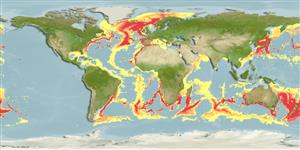sub class Elasmobranchii (ฉลามและกระเบน) (sharks and rays) >
Squaliformes (Sleeper and dogfish sharks) >
Somniosidae (Sleeper sharks)
Etymology: Centroscymnus: centr[um] (L.), prickle or sharp point, referring to spines on both dorsal fins; scymnus, an ancient name for some kind of shark, derived from a Greek word meaning young animal, cub or whelp (See ETYFish); coelolepis: coelo-, from koilos (Gr.), hollow; lepis (Gr.), scale, referring to its concave skin denticles (See ETYFish).
Environment: milieu / climate zone / depth range / distribution range
นิเวศวิทยา
เกี่ยวกับทะเล,น้ำเค็ม สัตว์หน้าดินในเขตน้ำลึก; ระดับความลึก 128 - 3700 m (Ref. 55584), usually 400 - 2000 m (Ref. 35388). Deep-water; 5°C - 13°C (Ref. 117245); 75°N - 61°S, 98°W - 147°W
Western Atlantic: Grand Banks to Delaware, USA; Cuba (Ref. 26340). Eastern Atlantic: Iceland south along Atlantic slope to the southwestern Cape coast of South Africa; also western Mediterranean. Western Pacific: off Japan, New Zealand, and Australia (Ref. 6871, 31367). Western Indian Ocean: Seychelles (Ref. 76802).
Length at first maturity / ขนาด / น้ำหนัก / Age
Maturity: Lm 101.8, range 95 - 110 cm
Max length : 121 cm TL เพศผู้/กระเทย; (Ref. 122636); common length : 92.0 cm TL เพศผู้/กระเทย; (Ref. 247); น้ำหนักสูงสุดที่มีการรายงาน: 10.1 kg (Ref. 122636)
เงี่ยงครีบหลัง (รวม) : 2; เงี่ยงครีบก้น: 0. Dorsal fins with very small spines, very short snout, lanceolate upper teeth and bladelike lower teeth with short, oblique cusps, stocky body that does not taper abruptly from pectoral region, very large lateral trunk denticles with smooth, circular, acuspidate crowns in adults and subadults (Ref. 247). Uniformly golden brown to dark brown in color (Ref. 6871).
Found on continental slopes and abyssal plains (Ref. 6871). Feeds mainly on fish (including sharks) and cephalopods (Ref. 6871), also gastropods and cetacean meat (Ref. 5578). Ovoviviparous (Ref. 205), with 13 to 29 young per litter, born at 27-31 cm (Ref. 26346); 32-35 cm TL in North Atlantic (Ref. 98315). Utilized as fishmeal, dried and salted for human consumption, or as a source of squalene (Ref. 6871).
Ovoviviparous (Ref. 6871), with 13 to 29 young per litter (Ref. 26346). Born at 27-31 cm (Ref. 26346). Distinct pairing with embrace (Ref. 205).
Compagno, L.J.V., 1984. FAO Species Catalogue. Vol. 4. Sharks of the world. An annotated and illustrated catalogue of shark species known to date. Part 1 - Hexanchiformes to Lamniformes. FAO Fish. Synop. 125(4/1):1-249. Rome, FAO. (Ref. 247)
IUCN Red List Status (Ref. 130435: Version 2024-1)
Threat to humans
Harmless
Human uses
การประมง: มีการค้าเพียงเล็กน้อย
เครื่องมือ
Special reports
Download XML
แหล่งที่มาจากอินเตอร์เน็ต
Estimates based on models
Preferred temperature (Ref.
123201): 0.8 - 10.3, mean 3.9 °C (based on 2755 cells).
Phylogenetic diversity index (Ref.
82804): PD
50 = 0.5313 [Uniqueness, from 0.5 = low to 2.0 = high].
Bayesian length-weight: a=0.00380 (0.00289 - 0.00500), b=3.12 (3.04 - 3.20), in cm total length, based on LWR estimates for this species (Ref.
93245).
ระดับชั้นอาหาร (Ref.
69278): 4.5 ±0.1 se; based on diet studies.
ความสามารถในการกลับคืนสู่ปกติ (Ref.
120179): ต่ำมาก, เวลาต่ำสุดที่จะทำให้ประชากรเพิ่มขึ้นเป็น 2 เท่าใช้เวลามากกว่า 14 ปี (Fec=13-29).
Prior r = 0.03, 95% CL = 0.02 - 0.05, Based on 1 full stock assessment.
Fishing Vulnerability (Ref.
59153): High to very high vulnerability (73 of 100).
Climate Vulnerability (Ref.
125649): Moderate vulnerability (38 of 100).
Nutrients (Ref.
124155): Calcium = 4.91 [1.03, 28.49] mg/100g; Iron = 0.266 [0.063, 0.926] mg/100g; Protein = 20.1 [17.1, 22.2] %; Omega3 = 0.308 [0.110, 0.995] g/100g; Selenium = 20.9 [5.9, 65.6] μg/100g; VitaminA = 14.7 [2.8, 82.3] μg/100g; Zinc = 0.291 [0.136, 0.596] mg/100g (wet weight); based on
nutrient studies.
